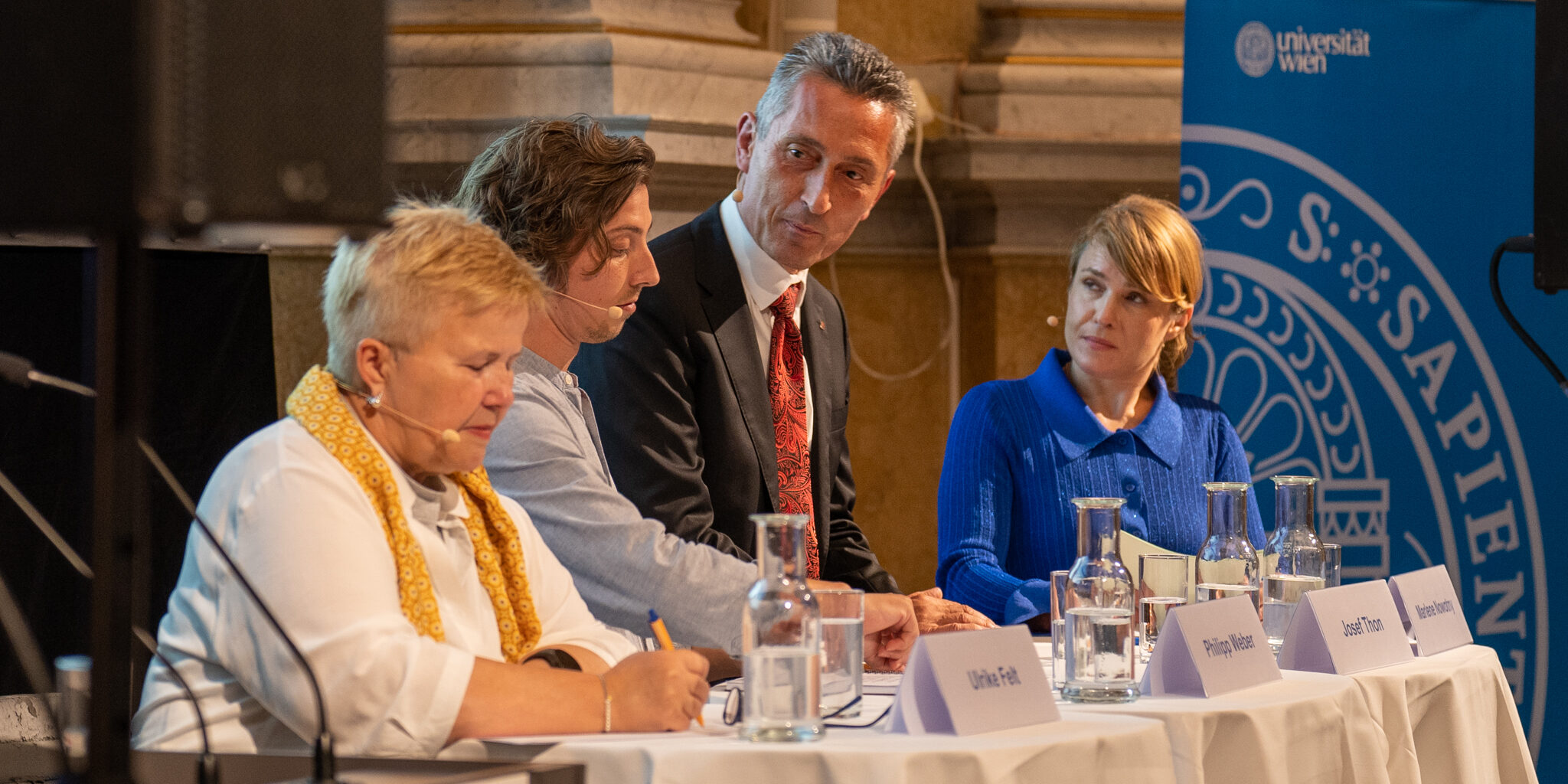Zum zehnjährigen Jubiläum von „Umwelt im Gespräch“ beschäftigte sich die Veranstaltungsreihe mit einem aktuellen Thema: Abfall. Mit Beginn dieses Kalenderjahres wurden in Österreich die Recyclingrichtlinien rund um die gelbe Tonne geändert, während der Covid-Pandemie verbreiteten sich Bilder großer Mengen von medizinischem Müll und Laborabfall im Internet, und der Umgang mit Altstoffen zur Lösung von Umweltfragen ist laufend in aller Munde. Unser Verhalten rund um Abfall ist allgegenwärtig und bot so viel Stoff für interessante Diskussionen im Zuge der Veranstaltung.
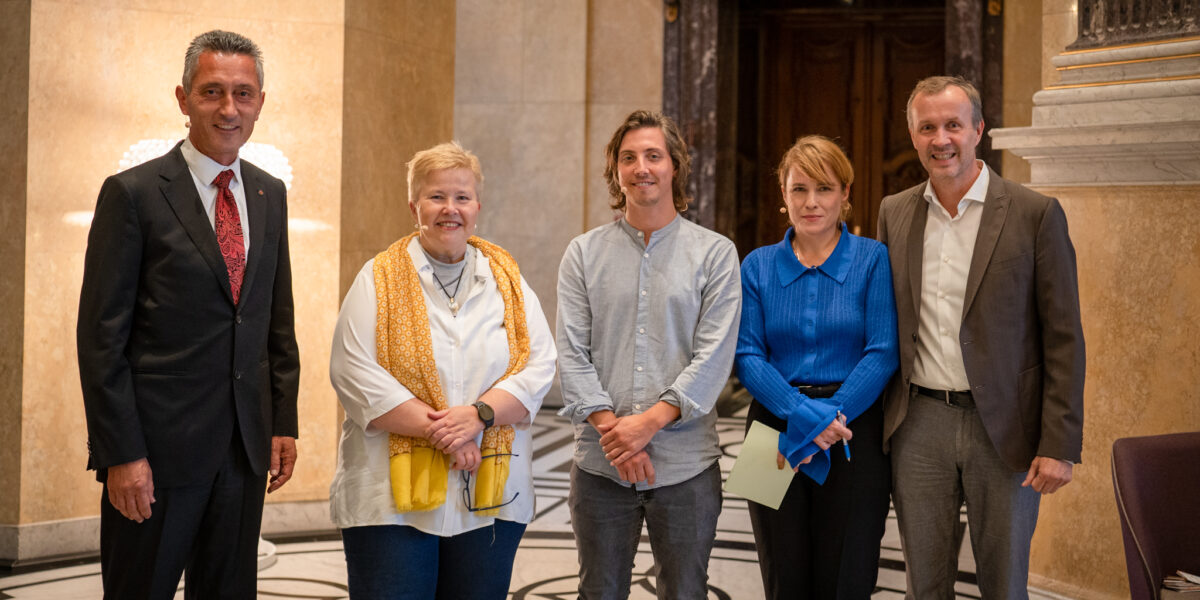
Anlässlich der Jubiläumsausgabe der Veranstaltungsreihe „Umwelt im Gespräch“ konnten zehn Personen je zwei Karten gewinnen, die nicht nur den Besuch der Abendveranstaltung, sondern auch die Teilnahme an einer exklusiven Führung zum Thema der Veranstaltung durch die Sammlung des Naturhistorischen Museums sicherten. Karina Grömer vom Naturhistorischen Museum nahm die Besucher*innen mit auf eine Reise durch den Goldschatz des Museums bis hin zu den Hallstätter Funden, samt einem Besuch bei der Venus von Willendorf. Auch hier lag der Fokus auf dem menschlichen Umgang mit Abfall. Archäolog*innen seien große Fans des Abfalls, da in seinen Untiefen meistens die spannendsten wissenschaftlichen Erkenntnisse liegen würden. Beispielsweise waren es Funde von menschlichen Überresten – vom Skelett bis hin zu den Exkrementen – die Forscher*innen viel über den Alltag unserer Vorfahren gelehrt hätten. Mit viel Fachkenntnis und noch mehr Humor lieferte Frau Grömer so spannende Einblicke in den menschlichen Umgang mit Abfall – über die Jahrtausende hinweg.
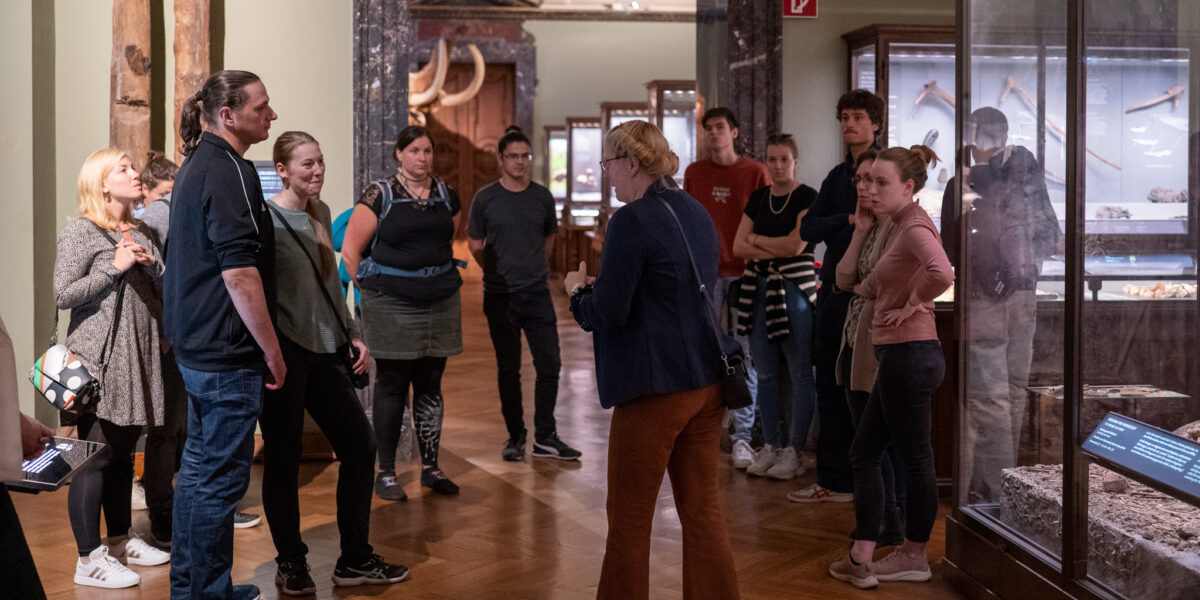
Danach fanden sich alle Gäste in der Oberen Kuppelhalle des Naturhistorischen Museums ein. Moderiert von Marlene Nowotny (Ö1) begann der Abend mit Grußworten von Katrin Vohland, der Generaldirektorin des Museums, gefolgt von der Vizerektorin der Universität Wien, Manuela Baccarini, und einer Einleitung von Universitätsprofessor Thilo Hofmann, Leiter des Forschungsverbund Umwelt und Klima. Dies war die zweite Ausgabe von „Umwelt im Gespräch“, die unter dem Schirm des 2023 neu gegründeten Forschungsverbunds veranstaltet wurde.
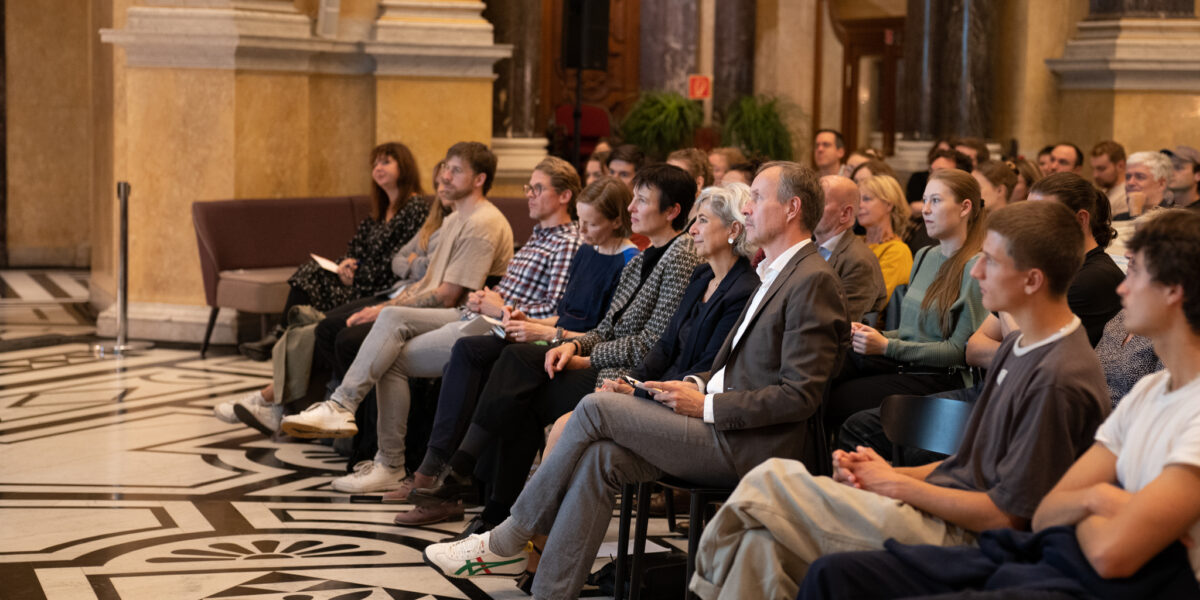
Ulrike Felt, Mitglied des Forschungsverbunds, sowie der Forschungsplattform PLENTY, und Professorin für Wissenschafts- und Technikforschung an der Universität Wien, begab sich in ihrem Impulsvortrag auf „Spurensuche – Geschichten über das, was übrigbleibt“. Sie legte den Fokus auf die menschliche Tendenz, viel Hoffnung in neue Innovationen zur Lösung von Problemen zu setzen, die ihrerseits jedoch immer neue Herausforderungen mit sich brächten.
Als Beispiele für dieses menschliche Verhalten lieferte Ulrike Felt drei Beispiele. Zu Beginn sprach sie vom Recycling – einem unumstößlichen Hoffnungsträger der Umweltpolitik. So sinnvoll der Prozess auch sei, würde er doch oft nicht bis zum Ende durchgeführt und hinterlasse deshalb noch immer Überreste. Diese Abfall-Überbleibsel würden schließlich in andere Länder exportiert – man spräche von „Müll-Kolonialismus“. Ein zweites Beispiel sei der Prozess der Digitalisierung. Diese wird oftmals als Weg zur Nachhaltigkeit gehandelt, ist jedoch selbst für große Mengen an Abfall verschiedenster Art verantwortlich. Ressourcenintensive Wertschöpfung von seltenen Metallen, „E-Waste“ und riesige Datenzentren seien hier nur drei Bereiche einer komplexen und umfassenden Herausforderung. Zuletzt sprach Frau Felt von erneuerbaren Energien, wiederum große Hoffnungsträger in den aktuellen politischen Diskussionen. Doch so sinnvoll der Einsatz von Photovoltaik und Co einerseits auch sein mag, führe andererseits auch er zu neuen Herausforderungen. Die Rotorblätter von Windrädern stellen beispielsweise ein Recyclingproblem dar, für das noch keine Lösung gefunden wurde. Als „grüne Konfliktmaterialien“ sind auch diese schwerentsorgbaren Materialien Abfall, der die Menschheit noch lange beschäftigen wird.
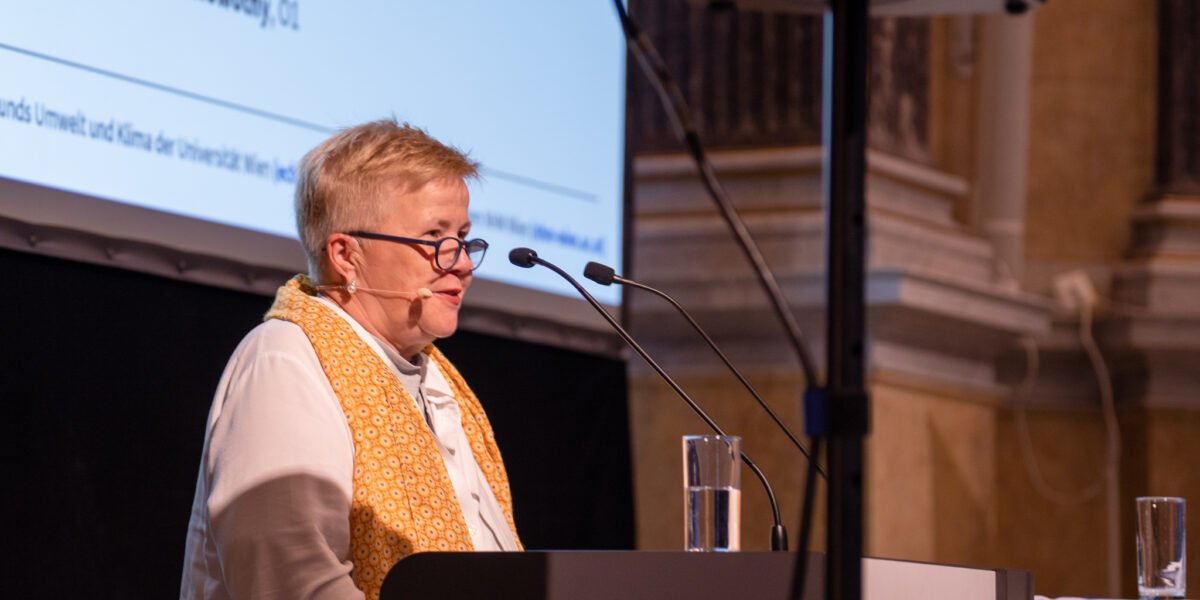
Eingebettet in Italo Calvinos Geschichte der Stadt Leonias – die Stadt, die sich jeden Tag neu erfindet – betonte Ulrike Felt in Ihrem Vortrag, dass Innovationen allein nicht reichen. Wer den Fokus nur auf das Neue legt, vergisst: auch das Neue wird eines Tages alt sein und aussortiert werden. Und die Lösungen für diesen zukünftigen Zustand müssen immer bereits im Innovationsprozess mitbedacht werden.
Auf den Impulsvortrag folgte eine von Marlene Nowotny moderierte Podiumsdiskussion. Josef Thon, Leiter der für Abfallwirtschaft und Straßenreinigung zuständigen MA48 der Stadt Wien, war der Meinung, dass der Fokus innerhalb der Diskussion rund um Abfall und Umweltverschmutzung häufig falsch gelegt werde. Als Beispiel nannte er das mediale Phänomen Plastikstrohhalme, das zu einem breitflächigen Ersatz der „Übeltäter“ durch Papierstrohhalme geführt hatte. Die Papierversion habe sich nun aber als Träger der sogenannten „Forever chemicals“ herausgestellt – hochgradig resistente und schwer abbaubare Materialien. Ulrike Felt schloss an, die Menschheit müsse sich die Frage stellen, was wir von den vielen Dingen, die wir erst konsumieren und dann entsorgen, überhaupt bräuchten. Menschen würden in Bedürfnisse „hineinsozialisiert“, die uns zum Konsumieren von Gütern treiben, die wir eigentlich nicht bräuchten.
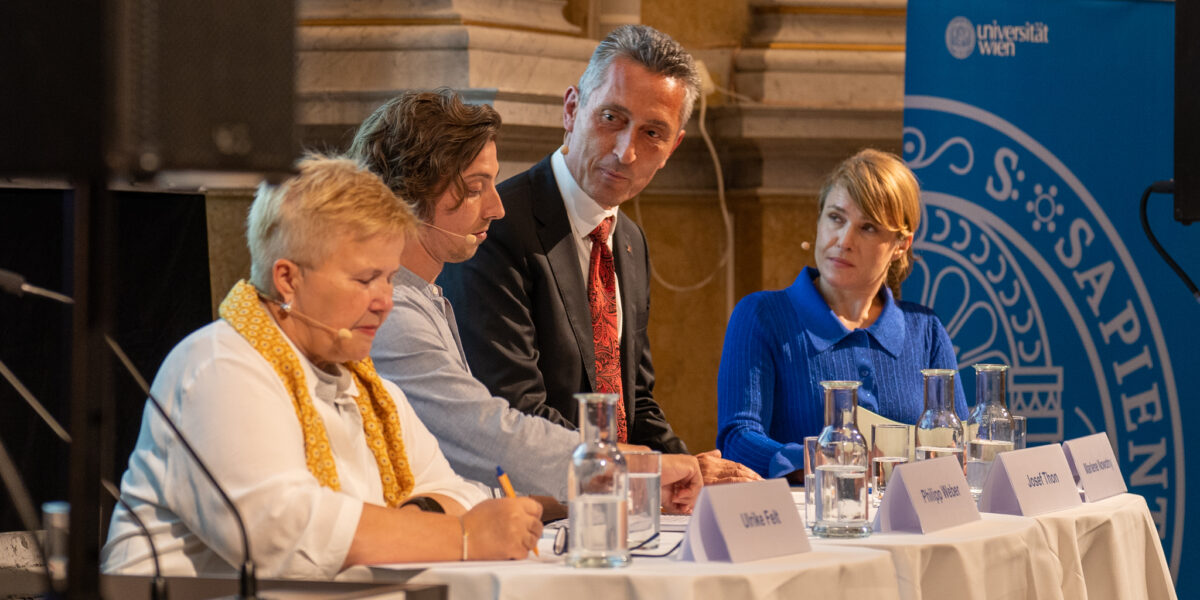
Philipp Weber, Mitbegründer der Initiative „Green Labs Austria“, Mitglied im Nachhaltigkeitsbeirat der Universität Wien und wissenschaftlicher Mitarbeiter am Department für funktionelle und evolutionäre Ökologie, lenkte die Diskussion auf den Bereich der Wissenschaft und die große Menge an Abfallmaterialien im Labor. Dinge wie der Umstieg von einer Plastikpipette auf eine gläserne würden vielleicht nur wie kleine Schritte wirken, diese könnten insgesamt aber dennoch viel bewegen.
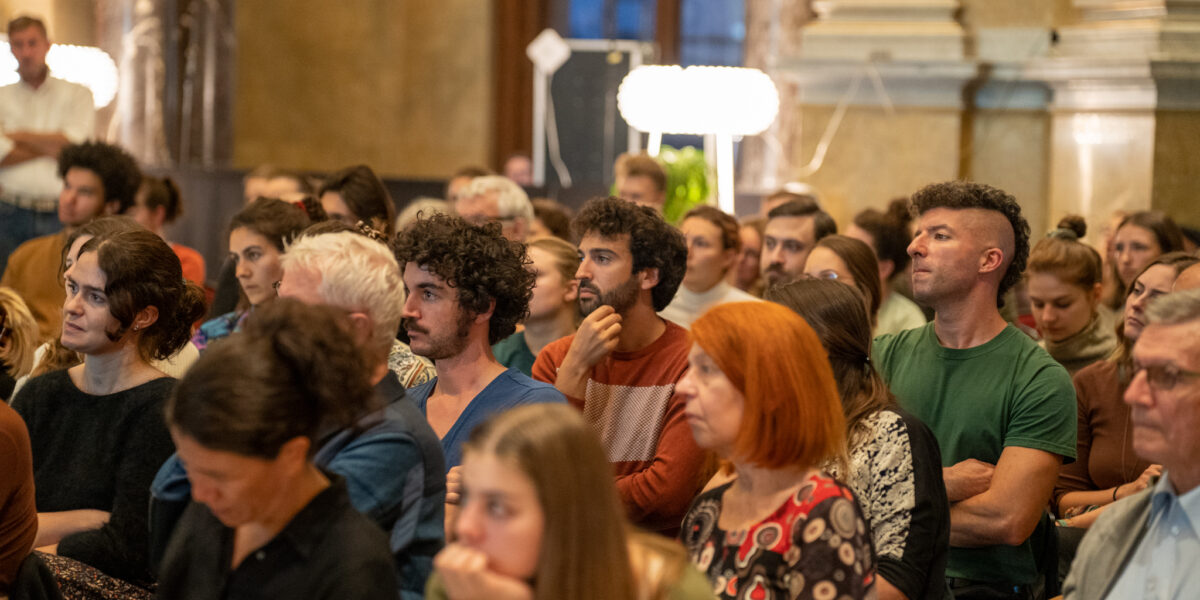
Zuhörer*innen machten schließlich auf die Intransparenz des Recyclingprozesses aufmerksam. Dabei wurde vor allem die gelbe Tonne betont, in der seit Beginn des Jahres in Österreich alle Plastik- und Metallverpackungen entsorgt werden. Frau Felt sprach im Anschluss daran davon, dass rechtliche Rahmenbedingungen häufig kompliziert und nicht immer funktionell seien, das große Thema Abfallwirtschaft aber oft zu umfangreich für eine Legislaturperiode sei. Philipp Weber sprach von seinem Wunsch, den Recyclingbegriff transparenter zu gestalten, damit Konsument*innen ein umfassenderes Verständnis entwickeln können. Josef Thon seinerseits erwähnte, dass es nicht nur einen funktionierenden Recycling-Prozess brauche, sondern die daraus entstandenen recycelten Produkte auch attraktiv genug sein müssen, um den neu hergestellten Konkurrenten vorgezogen zu werden. Damit würde es auch für die Industrie attraktiver, in die Herstellung von recycelten Produkten zu investieren.
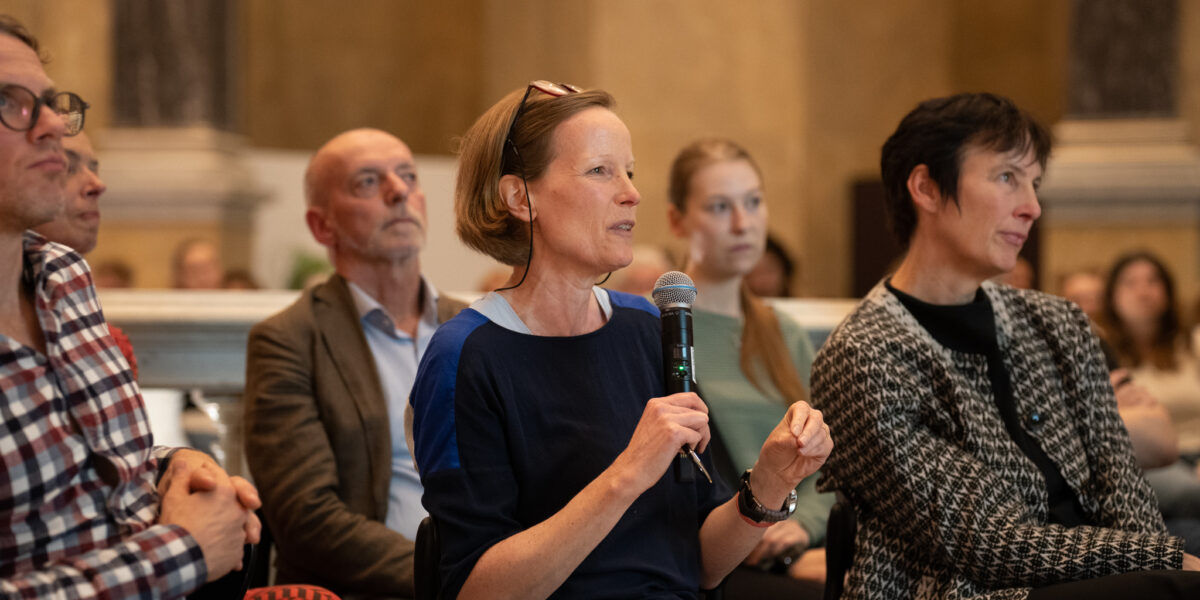
Eine Wortmeldung aus dem Publikum lenkte die Diskussion zurück zur Notwendigkeit einer Auseinandersetzung mit der Frage „Wie viel von dem, was wir konsumieren und entsorgen, brauchen wir wirklich?“. Daran anschließend betonten sowohl Ulrike Felt als auch Philipp Weber, dass in der Debatte um die Kreislaufwirtschaft häufig genau der Punkt der Reduktion ausgelassen werde, den man nicht umgehen könne. Es brauche außerdem Mut, die Industrie zu kritisieren und zu Veränderungen aufzufordern.
In einer abschließenden Runde waren sich die Diskussionspartner*innen einig, dass es für eine nachhaltigere Beziehung des Menschen zum Abfall vor allem zwei Dinge brauche: Einerseits den Willen, komplexe Sachverhalte in ihrer Gesamtheit aus verschiedenen Blickwinkeln zu betrachten. Und andererseits das Gespräch miteinander zu suchen – zusammen, statt gegeneinander zu arbeiten.
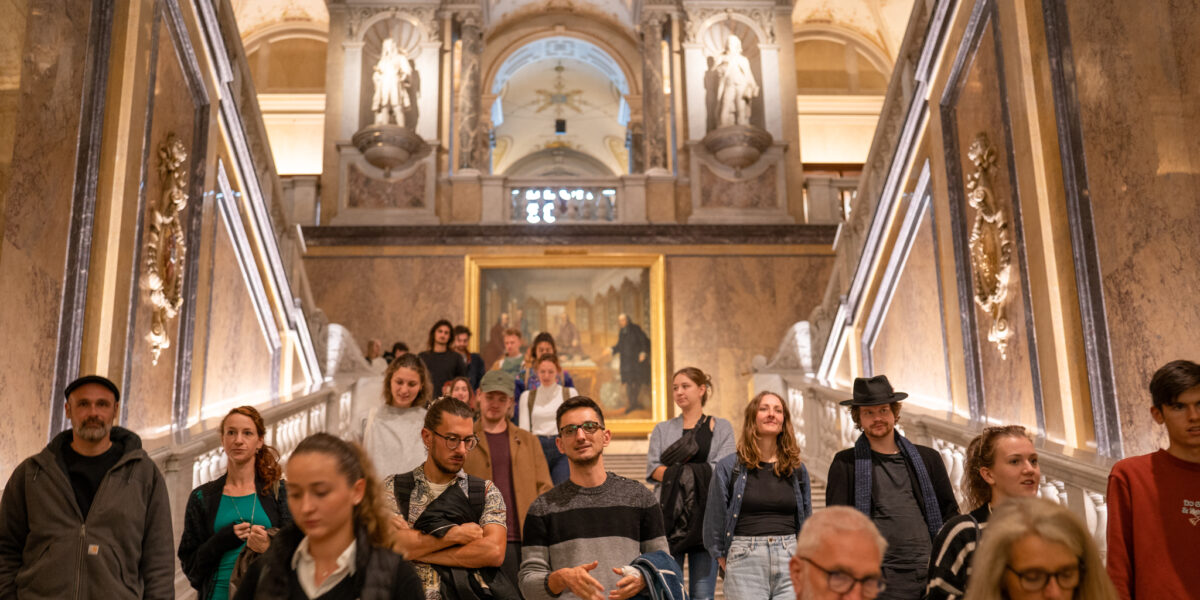
Videos
Graphic Recording
von Kathrin Gusenbauer (irrlicht-impressions.com)
- Forschungsplattform PLENTY
- Wie wird die Verwendung von Kunststoffen in der Landwirtschaft nachhaltiger?
- Plastikmüll: Belastung in Seen teilweise höher als im Ozean
- PFAS – Die „Ewigkeitschemikalien“
- Können wir die Weltbevölkerung 2050 ohne Plastik in der Landwirtschaft ernähren?
- Semesterfrage: „Aus welchem Stoff wird unsere Zukunft sein?“
